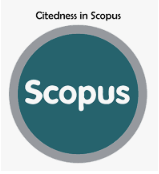Correlation between Students' Understanding of Islamic Legal Ethics and Anti-Corruption and Deradicalization Education
DOI:
https://doi.org/10.56404/jels.v4i1.113Keywords:
Islamic Legal Ethics, Anti-Corruption Education, DeradicalizationAbstract
This study aims to analyze the correlation between students' understanding of Islamic legal ethics with anti-corruption and deradicalization education. Using a mixed methods approach with explanatory sequential design, this study combines quantitative analysis using the Spearman correlation test and qualitative analysis through interviews and observations. The results of the study indicate that there is no significant relationship between understanding of Islamic legal ethics with anti-corruption and deradicalization education, as indicated by a significance value of 0.827 (> 0.05) and a correlation coefficient of -0.032 which describes a very weak and negative relationship. This finding supports Alatas' opinion (2006) that understanding ethics and morals is not always directly proportional to real actions in fighting corruption and radicalism. Therefore, it is recommended that anti-corruption and deradicalization education prioritize an applicative approach based on experience and real case studies to increase its effectiveness. Therefore, educational institutions are expected to be able to design a more integrative and multidimensional curriculum to achieve more optimal results in anti-corruption and deradicalization learning.
References
Ali Maulida, Didin Hafidhuddin, Ulil Armi Syafri, A. M. T. (2020). Tindak Pidana Korupsi Dalam Perspektif Hukum Indonesia Dan Pidana Islam. Al-Mashlahah: Jurnal Hukum Islam Dan Pranata Sosial Islam, 08, 53–54. Https://Doi.Org/10.30868/Am.V8i1.662
Bukhori, H. A., & Al Ayyubi, I. I. (2023). Hubungan Hasil Belajar Mata Pelajaran Pendidikan Agama Islam Dengan Perilaku Siswa Di Smpn 3 Cihampelas Kbb. Al-Mubin; Islamic Scientific Journal, 6(1), 17–30. Https://Doi.Org/10.51192/Almubin.V6i01.425
Bukhori, H. A., Al Ayyubi, I. I., Rohmatulloh, R., & Saepulloh, S. (2023). Efektivitas Manajemen Dalam Penerapan Model Pembelajaran Tipe Mind Mapping Untuk Meningkatkan Hasil Belajar Siswa. Islamic Management: Jurnal Manajemen Pendidikan Islam, 6(01), 65–78. Http://Dx.Doi.Org/10.30868/Im.V6i01.3445
Garrison, D. R., & Kanuka, H. (2004). Blended Learning: Uncovering Its Transformative Potential In Higher Education. The Internet And Higher Education, 7(2), 95–105. Https://Doi.Org/10.1016/J.Iheduc.2004.02.001
Johnson, E., Mendoza, C., & Sobirin, M. S. (2024). Strategies Of School Principals In Improving Educational Quality: An Analysis Of Best Practices In American Schools. Jmpi: Jurnal Manajemen, Pendidikan, Dan Pemikiran Islam, 2(2).
Ma, X. Z., Ertmer, P. A., & Pelgrumen, C. P. (2024). The Impact Of Technology Integration On Student Learning Outcomes. Jtl: Journal Of Teaching And Learning, 1(1), 73–90.
Mualif, M. (2022). Integrasi Nilai-Nilai Antikorupsi Dalam Materi Pendidikan Agama Islam. Misykat Al-Anwar Jurnal Kajian Islam Dan Masyarakat, 5(2), 191. Https://Doi.Org/10.24853/Ma.5.2.191-220
Mubarak, A. M., & Hassan, I. (2021). Challenges Of Islamic Education In The Era Of Globalization: A Proposed Holistic Solution. International Journal Of Academic Research In Progressive Education And Development, 10(3), Pages 337-349. Https://Doi.Org/10.6007/Ijarped/V10-I3/10748
Murharyana, M., Al Ayyubi, I. I., & Rohmatulloh, R. (2023). Pendidikan Akhlak Anak Kepada Orang Tua Dalam Perspektif Al-Quran. Piwulang: Jurnal Pendidikan Agama Islam, 5(2), 175–191. Http://Dx.Doi.Org/10.32478/Piwulang.V5i2.1515
Murharyana, M., Al Ayyubi, I. I., Rohmatulloh, R., & Ikromi, S. N. (2024). The Effects Of Islamic Religious Education Learning On Students’ Motivation. At-Tadzkir: Islamic Education Journal, 3(1), 1–14. Https://Doi.Org/10.59373/Attadzkir.V3i1.44
Murharyana, M., Al Ayyubi, I. I., Rohmatulloh, R., & Suryana, I. (2023). Behavior Change Of Darul Falah Senior High School Students After Attending Tabligh Akbar. Dirasah International Journal Of Islamic Studies, 1(2), 68–77. Https://Doi.Org/10.59373/Drs.V1i2.17
Nurhikmah, N. (2024). Character Education Islam From The Views Of Imam Al-Ghazali. Jurnal Al Burhan, 4(1), 53–66. Https://Doi.Org/10.58988/Jab.V4i1.300
Prayetno, E., Amalia, D., Rahayu, M. A., & Asri, M. R. (2024). Community Service: Tea From Sukun Leaves As A Traditional Beverage With A Modern Approach. Jurnal Al Maesarah: Jurnal Pengabdian Kepada Masyarakat Bidang Pendidikan, Sosial, Dan Kemasyarakatan, 3(2), 92–104.
Prayetno, E., Ibnu, & Deden. (2024). Student Tolerance Attitudes In Islamic Boarding Schools. Southeast Asian Journal Of Islamic Education, 07(02), 119–138.
Prayetno, E., Mubaraq, Z., Nur, A. K., & Al-, R. A. S. (2024). Contemporary Islamic Sects In Indonesia. Jurnal Al Burhan, 4(2), 113–125.
Prayetno, E., & Munirul. (2024). The Relationship Between Fluency In Speaking Arabic And Self- Confidence To Presentation Skills. Jurnal Kajian Keislaman, 11(2), 439–452. Https://Doi.Org/10.24952/Multidisipliner.V11i2.13661
Rubrica, R. (2019). An Action Research On Project-Based Learning And Understanding By Design And Their Effects On The Science Achievement And Attitude Of Science Students. Journal Of Education And Practice, 23(5). Https://Doi.Org/10.7176/Jep/10-5-02
Sabarudin, M., Al Ayyubi, I. I., & Nasrulloh, I. (2022). Faktor Peradaban Islam Era Sahabat Nabi Hingga Zaman Kontemporer. Jazirah: Jurnal Peradaban Dan Kebudayaan, 3(1), 194–205. Https://Doi.Org/10.51190/Jazirah.V3i1.60
Sabarudin, M., Al Ayyubi, I. I., & Rohmatulloh, R. (2023). Metode Project-Based Learning Untuk Menumbuhkan Nilai-Nilai Pancasila. Almaheer: Jurnal Pendidikan Islam, 1(02), 15–22.
Sabarudin, M., Al Ayyubi, I. I., Rohmatulloh, R., & Indriyani, S. (2023). The Effect Of Contextual Teaching And Learning Models On Al-Quran And Hadith Subjects. At-Tadzkir: Islamic Education Journal, 2(2), 129–142. Https://Doi.Org/10.59373/Attadzkir.V2i2.43
Sabarudin, M., Al Ayyubi, I. I., Rohmatulloh, R., Suryana, I., & Wijaya, T. T. (2024). Exploring The Foundations Of Islamic Education: Insights From Ibn Sina And Ibn Khaldun. Tribakti: Jurnal Pemikiran Keislaman, 35(1), 127–142. Https://Doi.Org/10.33367/Tribakti.V35i1.4266
Sabarudin, M., Al Ayyubi, I. I., Suryana, I., Rohmatulloh, R., & Saepulloh, S. (2023). The Effect Of The Savi Learning Model On Arabic Writing Skills: A Case Study At Mts Arrukhsatul ‘Ulum, West Bandung. Khulasah: Islamic Studies Journal, 5(2), 102–111. Https://Doi.Org/10.55656/Kisj.V5i2.114
Sarkar, S., Mohapatra, S., & Sundarakrishnan, J. (2017). Assessing Impact Of Technology Based Digital Equalizer Programme On Improving Student Learning Outcomes. Education And Information Technologies, 22(1), 195–213. Https://Doi.Org/10.1007/S10639-015-9434-0
Sholeh, M. I. (2023a). Evaluation And Monitoring Of Islamic Education Learning Management In Efforts To Improve Education Quality. Communautaire: Journal Of Community Service, 2(2), 108–117. Https://Doi.Org/10.61987/Communautaire.V2i2.159
Sholeh, M. I. (2023b). Menghadapi Persaingan Sengit Lembaga Pendidikan: Strategi Diferensiasi Dalam Pemasaran Lembaga Pendidikan Islam Di Indonesia. 1(3).
Sholeh, M. I., Azah, N., Arifin, Z., Rosyidi, H., Sokip, S., Syafi’i, A., & Sahri, S. (2024). Development Of A Multicultural Curriculum To Enhance Student Tolerance In Senior High School. Ije : Interdisciplinary Journal Of Education, 2(3), 163–176. Https://Doi.Org/10.61277/Ije.V2i3.147
















